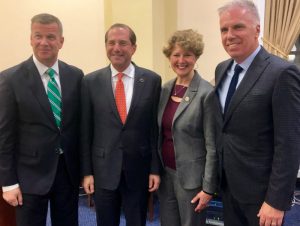
U.S. Rep. Susan Brooks (R-IN) is pushing for the Pandemic and All Hazards Preparedness and Advancing Innovation Act of 2018 (PAHPA), which was approved by the U.S. House of Representatives in September, to be signed into law this year.
In a discussion on Wednesday hosted by the Alliance for Biosecurity about biosecurity preparedness and attended by members of the Congressional Biodefense Caucus, Rep. Brooks, who sponsored the legislation, H.R. 6378, told the audience that PAHPA ensures that the national stockpile of vaccines, medical equipment and diagnostics are prioritized for further development. In addition, the act would fund the training of health care professionals to respond to possible pandemic outbreaks.
U.S. Reps. Anna Eshoo (D-CA), Greg Walden (R-OR), and Frank Pallone, Jr. (D-NJ) cosponsored the bill, which has been under consideration in the Senate since Sept. 26.
Reps. Brooks and Eshoo established the Congressional Biodefense Caucus this Congress as they worked on drafting the PAHPA legislation. The caucus serves as a platform to educate members of Congress on the threats the United States faces from a chemical, biological, radiological or nuclear attack or pandemic outbreak.
“I’m proud to have worked in the House with my colleagues, especially Congresswoman Eshoo, to pass this comprehensive bill, and hope my colleagues in the Senate work swiftly to do the same,” Brooks said.
Specifically, the PAHPA legislation would reauthorize funds to improve bioterrorism and other public health emergency preparedness and response activities, such as those operated by the Hospital Preparedness Program, the Public Health Emergency Preparedness Cooperative Agreement, Project BioShield, and the Biomedical Advanced Research and Development Authority (BARDA), part of the U.S. Health and Human Services’ Office of the Assistant Secretary for Preparedness and Response, for the advanced research and development of medical countermeasures.
As for funding, the proposal would create a Public Health Emergency Response Fund for the Health and Human Services Secretary to use as a “funding bridge” when an outbreak occurs. This bridge would be present until immediate funding is available from Congress to supplement with an emergency appropriations bill.
Secretary of Health and Human Services Alex Azar spoke to attendees and explained that pandemic influenza is the biodefense threat that concerned him the most. PAHPA would authorize $250 million for research and development of medical countermeasures to combat pandemic influenza, according to Brooks’ office.
Rick Bright, director of BARDA, and Robert Kadlec, Assistant Secretary for Preparedness and Response (ASPR), also participated in the event.
This summer The Alliance for Biosecurity — a coalition of biopharmaceutical companies and academic partners that support public-private partnerships in order to advance medical countermeasures for the benefit of public health and national security — along with the U.S. Chamber of Commerce, which represents the interests of more than 3 million businesses, penned a letter of support of PAHPA.
“Our groups support developing strategic partnerships between BARDA and the business community to mitigate threats that could pose a significant risk to U.S. health and safety,” the letter said.



